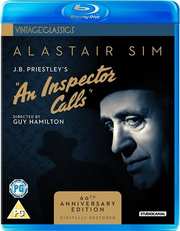Review for An Inspector Calls
Many viewers will know this film principally as a play by J.B. Priestly. Not only a firm favourite amongst the am-dram community it has also been something of a stalwart of GCSE syllabuses in the the UK. Stage adaptions always fill me with trepidation as they either look terribly stagey and one dimensional or they depart so fully from the original play as to make any real connection to it meaningless. ‘An Inspector Calls’ is a rare exception, adopting the simplicity of the stage version whilst employing enough characterful camera moves and close-ups to bring something fresh to it.
No doubt part of the play’s attraction to amateur theatres is its simplicity. It requires very little staging – in fact, in Priestley’s play, often very little more than a single room. The film, however, allows itself to move frequently outside the home during flash-back sequences though it does little to impact the otherwise stagey feel. This is very much a play first and a movie second.
The action takes place inside the home of the wealthy Birlings. The whole family is gathered to celebrate the engagement of the eldest child, Sheila (Eileen Moore) to a very handsome young man about town, Gerald Croft (Brian Worth). They are in the middle of a lively political debate when there is a knock on the door. It is Inspector Poole (Alistair Sim) who is a quiet mannered and polite individual. He says he has come to speak to pretty much every one in the house though doesn’t immediately say why. Mr. Birling, (Arthur Young) the bumptious head of the house, invites the Inspector to sit down and explain himself.
And thus the ‘stage’ is set for a series of inter-connected vignettes full of flashbacks and recriminations. The family learn of the unfortunate death of a young girl who it appears has taken her own life by swallowing disinfectant.
What follows (without bringing in too many spoilers) are a series of inter-related vignettes where it becomes apparent that any one of the household might have contributed in some way to the poor girl’s misery and therefore her demise.
So the first instance, for example, is the knowledge that factory owner Mr. Birling sacked the girl after she led a group of women to demand higher wages. As if this wasn’t enough, we learn that the girl was then sacked from her next job as the result of giggling at the daughter Sheila when she was trying on a hat. Humiliated. And over-reacting, Sheila insists that the girl is sacked or she will never shop in the store again.
And so it goes on. But as we learn more about the girl we start to see her very much as the victim of circumstance rather than in any way unpleasant or incompetent. Indeed, she is a kindly girl who is rather pretty too – just down on her luck.
So it’s a film about consequences – particularly with regard to class, where the upper echelons have significant powers over the lower classes.
Sim is sublimely cast as the all-seeing messenger – which is eventually understood by all. But have they learned their lesson? A curious twist in the tale shows that not all do!
The Blu-Ray transfer is excellent and the film is full of deeply crushed monochromatic blacks which stand up remarkable well, making this a real visual treat. Ted Scaife’s superb lenswork is not wasted here. It’s presented in its original aspect ratio of 1.37:1 – very close to classic full-screen.
The disc is very light on extras though does feature a nice interview with actress Jane Wenham (Eva Smith) recounting shooting the film and working with director Guy Hamilton and discussing her relations with the rest of the cast, including Sim.
In summary, a top notch release of a classic British film. Well worth picking up.

































Your Opinions and Comments
Be the first to post a comment!